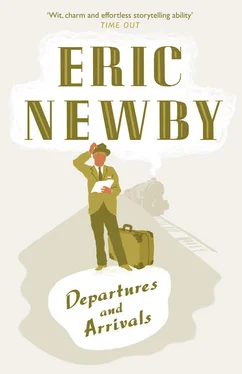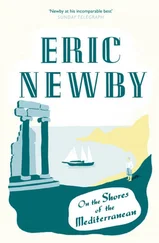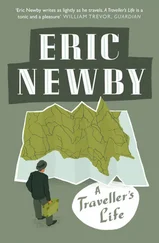ERIC NEWBY
Departures and Arrivals

To Wanda with love
Many thanks to Lucinda McNeile and Kate Morris for all their help
Cover
Title Page
Dedication
Introduction
Up to Ther Bend and Back
Travels with a Baby
Days and Nights on the Orient Express
Under the Crust of Coober Pedy
Walking the Plank
Follies and Grottoes
Journey through Syria
The Palio
Seeing the World on Two Wheels
Some Canals
The Land of the Camels
The Land of the Elephants
Two Degrees West
In Calabria
Way Out in Anatolia
Winter in Beijing
The Yemen
A Brief Trip to the Pontine Archipelago
Below the Purbeck Hills
Plates
Index
About the Author
Also by the Author
Copyright
About the Publisher
Whatever else we remember of our travels, we remember our departures and arrivals. Often they are the most enduring of all our memories of them. In 1963, together with Wanda, my wife, I embarked on the Ganges in an open boat to row from the foothills of the Himalayas to the Indian Ocean. Some 200 metres from our starting point, from which we had been seen off by an old man who dropped sacred sweets on us as provisions for the journey, and some 1,900 kilometres short of our destination in the Bay of Bengal, the boat grounded in some 40 centimetres of water which proved to be the uniform depth of the Ganges at this season at this point, and it took five-and-a-half days to cover the next 56 kilometres, mostly by pushing it.
Nothing in the course of the entire trip, which took three months to accomplish, left such an indelible imprint on our minds as the moment when we discovered that the Ganges was only 40 centimetres deep and that our boat drew 46 centimetres when loaded.
To depart is often more satisfying than to arrive unless you are the first on the scene. Nothing was more deflationary to Scott and his companions than to find that they were the second party to reach the South Pole. Would I have set off at all if I had known what the journey would be like or what I was going to find at my destination are questions I have often asked myself, reminded of the wartime poster which read ‘Don’t waste food! Why did you take it if you weren’t going to eat it?’ To which some wit added a codicil: ‘I didn’t know it was going to taste like this!’
For years explorers attempted to reach Timbuktu, the mysterious city on the edge of the Sahara that, ever since the twelfth century, had been the hub of the North African world, and in which salt had been traded for the seemingly inexhaustible gold of Guinea, a city in which, according to the Muslim traveller Leo Africanus, who visited it in 1526, there were plates and sceptres of solid gold ‘some whereof weigh 1,300 pounds’.
The first-known European to reach Timbuktu and return in one piece was Réné Caillié, a penniless young Frenchman who had been inspired to become an explorer by reading Robinson Crusoe. Too late to see it in its heyday – the trade in gold had more or less come to an end – he reached the fabled city after a terrifyingly dangerous journey on 20 April 1828. ‘I looked around,’ he wrote, ‘and found the sight before me did not answer my expectations of Timbuktu. The city presented, at first view, nothing but a mass of ill-looking houses, built of earth. Nothing was to be seen in all directions but immense plains of quicksand of a yellowish-white colour.’
No one really enjoys arriving anywhere by train. (Nor does anyone in their right mind enjoy departing or arriving by plane, with the possible exception of the pilot whose toy it is.) Will there be any porters? Will there be any trolleys for the luggage if there aren’t? Will there be any taxis? Will they be fitted with meters? These and similar questions that even the most hardened travellers ask themselves as the train comes into the platform all help to contribute to the particular form of angst , the generally non-specific but nonetheless acute form of anxiety described by Cyril Connolly (disguised under the nom de plume Palinurus) in The Unquiet Grave as the Angoisse des Gares, the Agony of the Stations: ‘Bad when we meet someone at the station, much worse when we are seeing them off; not present when departing oneself, but unbearable when arriving …’
The best arrivals are by sea, that is unless your engine has broken down and the Cliffs of Moher are a lee shore. The first sight of a great city from the sea is big medicine, powerful magic, unforgettable, however much of a let-down it may prove to be on closer acquaintance. New York seen from the Hudson in the early morning with the sun roaring up over the East River turning the tall buildings into gigantic Roman candles; Venice as your vessel runs in through the Porto di Lido into St Mark’s Basin with the domes and campaniles liquefying and reconstituting themselves in the mirage; Istanbul as your ship comes up the Marmara and sweeps round Seraglio Point towards the Golden Horn and you see silhouetted against the evening sky the fantastic, improbable, incomparable skyline of Old Stamboul.
It is not only the great cities that have this effect on the arriving traveller. This is how T. E. Lawrence described his first sight of Jidda, the then little port of Mecca, seen from the deck of a passenger ship in the Red Sea while he was on his way to meet the leaders of the Arab Revolt in 1917: ‘When at last we anchored in the outer harbour off the white town, between the blazing sky and its reflection in the mirage which swept and rolled over the wide lagoon, then the heat of Arabia came out like a drawn sword and struck us speechless … There were only lights and shadows, the white and black gaps of streets: in front, the pallid lustre of the haze shimmering upon the inner harbour; behind, the dazzle of league after league of featureless sand running up to an edge of low hills, faintly suggested in the far away mist and heat.’
It is these and similar vistas, whether wild or civilized, that make one want to shout ‘How beautiful the world is!’, that made an elderly lady of my acquaintance, when taken on an outing from her native village in the Po Valley which she had never previously left, cry on arriving on the watershed of the Apennines from which there was an extensive view, ‘Com’è grande il mondo! ’ … ‘How big the world is!’ … and insist on being taken home.
Castelnau Mansions, Barnes, SW13, the block of flats in which I was born, in 1919, on the south side of Hammersmith Bridge, was one of several such blocks built in the 1900s on what had been marshland and open country.
Our flat was on the first floor – Three Ther Mansions, as it was known to the tradesmen who sent their delivery boys out on bicycles from the nearby shops to deliver my mother’s orders. And it had what the estate agents used to describe in the twenties as ‘commanding extensive and splendid views over the Metropolitan Water Board’s Reservoir and Filter Beds’. The filter beds were lovely, full of golden sand that I longed to play with, but was never able to do so as they were fenced in.
Castelnau, the main road which separated our block of flats from the reservoir, was and is the almost dead-straight road which runs from Hammersmith Bridge to the pub called until recently the Red Lion, and, although it is only about a mile long, it appears to be much longer. It was built in 1827, at the same time as the original Hammersmith Suspension Bridge, a beautiful, slender structure designed by William Tierney Clarke. In 1887 it was replaced by another suspension bridge of cast-iron, a rather elephantine structure designed by Sir Joseph Bazalgette, the man who designed the London sewers. (The IRA tried to blow it up in 1939, but was thwarted when a heroic passer-by picked up the bomb and threw it into the river.) The street was named Castelnau after the family seat of the Boileau family, Castelnau de la Gard at Nîmes, the head of the family being a General de Castelnau.
Читать дальше













